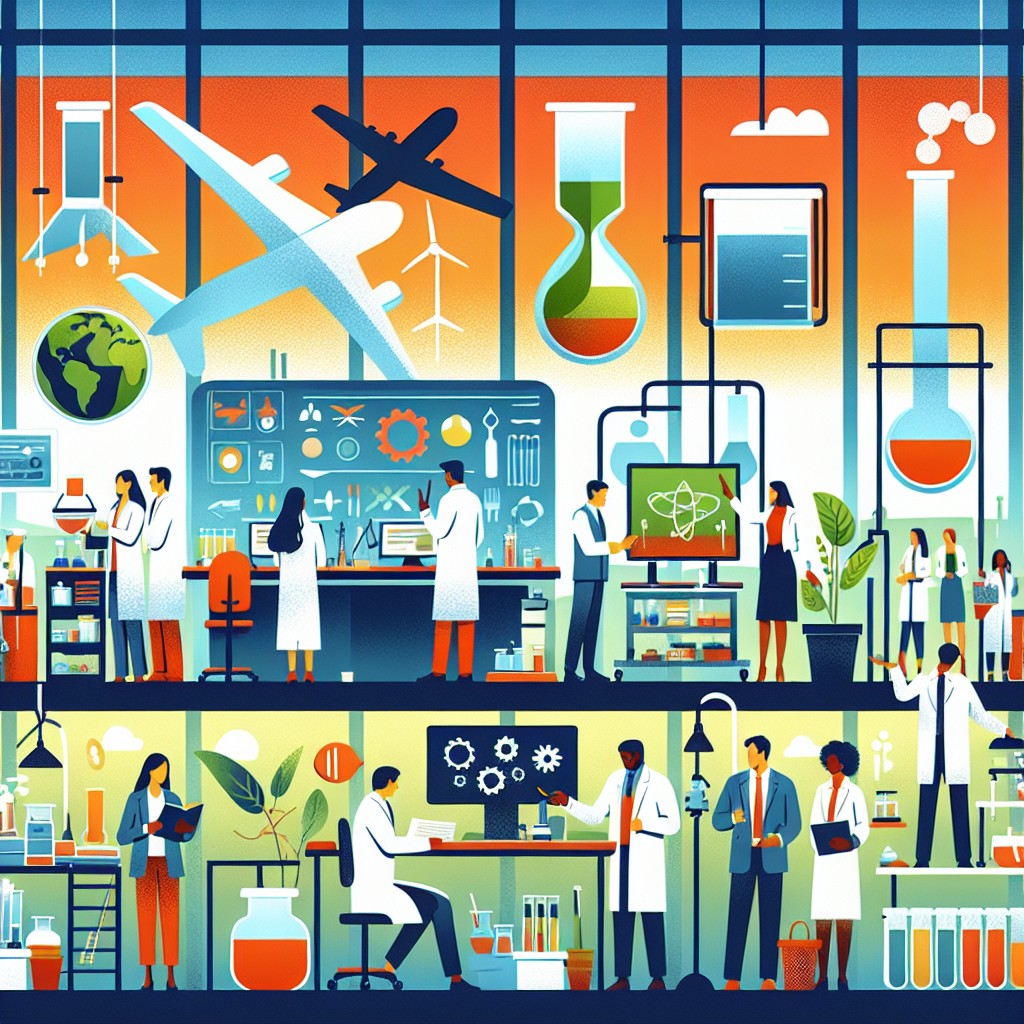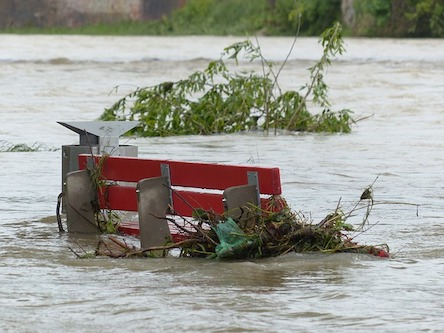Sustainable aviation fuels are gaining attention as a potential solution to reduce the carbon footprint of the aviation industry. Researchers like Ihab Ahmed at Sheffield University’s Sustainable Fuels Innovation Centre are working on developing synthetic fuels from renewable sources such as waste cooking oils and agricultural waste. These fuels offer the advantage of not adding to the overall carbon dioxide load in the atmosphere, making them a more environmentally friendly alternative to traditional fossil fuels.
The aviation industry is facing pressure to find alternatives to jet fuel, especially with the projected increase in the global airliner fleet over the next two decades. While newer aircraft are more fuel-efficient, the industry is exploring various technologies like hydrogen power and electrification for long-term sustainability. Sustainable aviation fuels, which can be produced to mimic conventional jet fuels, offer a more immediate solution as they can be used in existing aircraft.
Despite the potential benefits of sustainable aviation fuels, challenges remain in scaling up production to meet industry demands. Current supplies of these fuels are limited and come at a higher cost compared to traditional jet fuel. Governments are implementing mandates to increase the use of sustainable fuels, but production needs to be ramped up significantly to make them more affordable and widely available.
Various methods, such as biomass conversion and power-to-liquid processes, are being explored to produce sustainable aviation fuels. However, concerns exist regarding the environmental impact and scalability of these methods. While the aviation industry is pushing for increased production and cost reduction through economies of scale, environmentalists question the viability of these fuels in truly reducing carbon emissions from aviation.
Recent investments and partnerships in the sustainable aviation fuel sector show a growing interest in developing these fuels further. Initiatives like using human waste to produce aviation fuel demonstrate innovative approaches to sustainability in aviation. While the industry works towards reducing its carbon footprint, the road to widespread adoption of sustainable aviation fuels still faces challenges that need to be addressed for a more sustainable future in air travel.
Original news source: Will sustainable aviation fuels take off? (BBC)
🎧 Listen:
Slow
Normal
Fast
📖 Vocabulary:
| 1 | sustainable | Capable of being maintained over the long term without harming the environment |
| 2 | synthetic | Made by chemical synthesis, especially to imitate a natural product |
| 3 | renewable | Capable of being replenished naturally over time |
| 4 | projected | Estimated or forecasted based on current trends or data |
| 5 | electrification | The process of powering something with electricity |
| 6 | mandates | Official orders or commissions to do something |
| 7 | scalability | The ability to be expanded or increased in size or scope |
| 8 | economies | The financial benefits gained from increased production or efficiency |
| 9 | viability | The ability to work successfully or be effective |
| 10 | investments | The action of putting money into something for profit or benefit |
| 11 | partnerships | Collaborations or associations between parties for mutual benefit |
| 12 | initiatives | New plans or strategies intended to solve a problem or improve a situation |
| 13 | innovative | Featuring new methods or ideas; advanced and original |
| 14 | adoption | The act of starting to use something new or different |
| 15 | widespread | Existing or happening over a large area or among many people |
Group or Classroom Activities
Warm-up Activities:
– News Summary
Instructions: Ask students to work in pairs and summarize the main points of the article in their own words. Each pair will then share their summary with the class.
– Opinion Poll
Instructions: Divide the class into groups and have them discuss and debate the advantages and disadvantages of sustainable aviation fuels. After the discussion, each group will conduct a quick opinion poll within the class to see which side is more popular.
– Vocabulary Pictionary
Instructions: Write down key vocabulary words from the article on the board. Have students take turns coming to the board to draw a quick sketch representing the word while the others guess. This will help reinforce the new vocabulary.
– Think-Pair-Share
Instructions: Pose a question related to the article, such as “What are the challenges of scaling up production of sustainable aviation fuels?” Ask students to think about their answer, discuss it with a partner, and finally share their thoughts with the class.
– Headline Creation
Instructions: In groups, ask students to come up with a catchy headline that summarizes the main idea of the article. Encourage creativity and brevity in their headlines. Each group will then present their headline to the class and explain their choice.
🤔 Comprehension Questions:
1. What are some renewable sources being used to develop sustainable aviation fuels?
2. Why is the aviation industry under pressure to find alternatives to traditional jet fuel?
3. How do sustainable aviation fuels offer a more immediate solution compared to other alternative technologies?
4. What are some challenges in scaling up the production of sustainable aviation fuels?
5. What are some methods being explored to produce sustainable aviation fuels?
6. How are governments contributing to the increase in the use of sustainable aviation fuels?
7. What innovative approach to sustainability in aviation is mentioned in the article?
8. What are some concerns raised by environmentalists regarding the use of sustainable aviation fuels?
Go to answers ⇩
🎧✍️ Listen and Fill in the Gaps:
Sustainable aviation fuels are gaining attention as a potential solution to reduce the carbon footprint of the aviation industry. (1)______ like Ihab Ahmed at Sheffield University’s Sustainable Fuels (2)______ Centre are working on developing (3)______ fuels from renewable sources such as waste cooking oils and agricultural waste. These fuels offer the advantage of not adding to the overall carbon (4)______ load in the atmosphere, making them a more environmentally friendly alternative to traditional fossil fuels.
The aviation industry is facing pressure to find alternatives to jet fuel, especially with the projected increase in the global airliner (5)______ over the next two decades. While newer aircraft are more fuel-efficient, the industry is exploring various technologies like hydrogen (6)______ and electrification for long-term sustainability. Sustainable aviation fuels, which can be produced to (7)______ conventional jet fuels, offer a more (8)______ solution as they can be used in existing aircraft.
Despite the potential benefits of sustainable aviation fuels, challenges remain in scaling up production to meet industry demands. Current supplies of these fuels are limited and come at a higher cost compared to (9)______ jet fuel. Governments are implementing mandates to increase the use of sustainable fuels, but (10)______ needs to be ramped up significantly to make them more affordable and widely available.
Various (11)______, such as biomass conversion and power-to-liquid processes, are being explored to produce sustainable (12)______ fuels. However, concerns exist regarding the environmental impact and scalability of these methods. While the aviation industry is pushing for increased production and cost reduction through economies of scale, environmentalists question the viability of these fuels in truly (13)______ carbon emissions from aviation.
Recent investments and partnerships in the sustainable aviation fuel sector show a growing interest in developing these fuels further. (14)______ like using human (15)______ to produce aviation fuel demonstrate innovative approaches to sustainability in aviation. While the industry works towards reducing its carbon footprint, the road to (16)______ adoption of sustainable aviation fuels still faces challenges that need to be addressed for a more sustainable future in air travel.
Go to answers ⇩
💬 Discussion Questions:
Students can ask a partner these questions, or discuss them as a group.
1. What is your opinion on the use of sustainable aviation fuels as a solution to reduce the carbon footprint of the aviation industry?
2. How would you feel if sustainable aviation fuels became the primary source of fuel for airplanes in the future?
3. Do you think the aviation industry should prioritize investing in sustainable aviation fuels over other technologies like hydrogen power and electrification? Why or why not?
4. How do you think the use of waste cooking oils and agricultural waste to produce synthetic fuels for aviation impacts the environment positively?
5. Do you believe that governments should play a larger role in mandating the use of sustainable aviation fuels to accelerate their adoption? Why or why not?
6. What are some potential challenges that could arise from scaling up production of sustainable aviation fuels to meet industry demands?
7. How do you think the aviation industry can address concerns about the environmental impact and scalability of methods used to produce sustainable aviation fuels?
8. Why do you think sustainable aviation fuels come at a higher cost compared to traditional jet fuel, and how could this cost be reduced in the future?
9. How do you feel about the innovative approaches, like using human waste to produce aviation fuel, being explored in the sustainable aviation fuel sector?
10. Do you think the current investments and partnerships in sustainable aviation fuels are sufficient to drive widespread adoption in the industry? Why or why not?
11. What are some potential benefits and drawbacks of using sustainable aviation fuels in terms of air travel safety and efficiency?
12. How do you think the development and use of sustainable aviation fuels could impact the overall image and reputation of the aviation industry?
13. In your opinion, what role should consumers play in promoting the use of sustainable aviation fuels by airlines?
14. How important do you think it is for the aviation industry to collaborate with environmentalists and other stakeholders to address concerns and challenges related to sustainable aviation fuels?
15. What do you believe is the most critical factor that will determine the success or failure of sustainable aviation fuels in the aviation industry?
Individual Activities
📖💭 Vocabulary Meanings:
Match each word to its meaning.
Words:
1. sustainable
2. synthetic
3. renewable
4. projected
5. electrification
6. mandates
7. scalability
8. economies
9. viability
10. investments
11. partnerships
12. initiatives
13. innovative
14. adoption
15. widespread
Meanings:
(A) Capable of being replenished naturally over time
(B) Made by chemical synthesis, especially to imitate a natural product
(C) Capable of being maintained over the long term without harming the environment
(D) Featuring new methods or ideas; advanced and original
(E) Collaborations or associations between parties for mutual benefit
(F) The ability to work successfully or be effective
(G) The ability to be expanded or increased in size or scope
(H) The process of powering something with electricity
(I) The action of putting money into something for profit or benefit
(J) Existing or happening over a large area or among many people
(K) Official orders or commissions to do something
(L) The financial benefits gained from increased production or efficiency
(M) Estimated or forecasted based on current trends or data
(N) New plans or strategies intended to solve a problem or improve a situation
(O) The act of starting to use something new or different
Go to answers ⇩
🔡 Multiple Choice Questions:
1. What is one advantage of sustainable aviation fuels mentioned in the article?
(a) They are cheaper than traditional jet fuel
(b) They are only suitable for newer aircraft
(c) They are produced from non-renewable sources
(d) They do not add to the overall carbon dioxide load in the atmosphere
2. What is one challenge mentioned in the article regarding sustainable aviation fuels?
(a) Current supplies are limited and costly
(b) They are more harmful to the environment than traditional jet fuel
(c) They are readily available and affordable
(d) They do not offer any environmental benefits
3. Which university is mentioned as having a Sustainable Fuels Innovation Centre in the article?
(a) Oxford University
(b) Harvard University
(c) Sheffield University
(d) Cambridge University
4. What are researchers like Ihab Ahmed working on developing?
(a) Traditional fossil fuels
(b) Nuclear energy for aviation
(c) Electric planes
(d) Synthetic fuels from renewable sources
5. What is one technology mentioned in the article that the aviation industry is exploring for long-term sustainability?
(a) Coal power
(b) Hydrogen power
(c) Solar power
(d) Wind power
6. What is one method mentioned in the article for producing sustainable aviation fuels?
(a) Coal mining
(b) Biomass conversion
(c) Oil drilling
(d) Fracking
7. What is one concern mentioned in the article regarding sustainable aviation fuels?
(a) Environmental impact and scalability of production methods
(b) Affordability and availability
(c) Lack of interest from the aviation industry
(d) Easy production and wide availability
8. What do recent investments and partnerships in the sustainable aviation fuel sector demonstrate?
(a) Lack of interest in sustainable aviation fuels
(b) Decrease in interest in sustainability in aviation
(c) Growing interest in developing these fuels further
(d) No need for further development in sustainable aviation fuels
Go to answers ⇩
🕵️ True or False Questions:
1. Various methods, such as coal conversion and gas-to-liquid processes, are being explored to produce sustainable aviation fuels.
2. The road to widespread adoption of sustainable aviation fuels still faces challenges that need to be addressed for a more sustainable future in air travel.
3. Challenges do not exist in scaling up production of sustainable aviation fuels to meet industry demands, as current supplies are abundant and come at a lower cost compared to traditional jet fuel.
4. Researchers at Sheffield University’s Sustainable Fuels Innovation Centre are working on developing synthetic fuels from renewable sources like waste cooking oils and agricultural waste.
5. Sustainable aviation fuels can be produced to mimic conventional jet fuels, allowing them to be used in existing aircraft.
6. Recent divestments and solo ventures in the sustainable aviation fuel sector indicate a declining interest in further developing these fuels.
7. The aviation industry is under pressure to find alternatives to jet fuel due to the projected increase in the global airliner fleet over the next two decades.
8. Sustainable aviation fuels do add to the overall carbon dioxide load in the atmosphere, making them an equally harmful alternative to traditional fossil fuels.
Go to answers ⇩
📝 Write a Summary:
Write a summary of this news article in two sentences.
Check your writing now with the best free AI for English writing!
Writing Questions:
Answer the following questions. Write as much as you can for each answer.
Check your answers with our free English writing assistant!
1. What are sustainable aviation fuels and how are they different from traditional fossil fuels?
2. Why is the aviation industry under pressure to find alternatives to jet fuel?
3. What are some of the challenges in scaling up the production of sustainable aviation fuels?
4. What are some of the methods being explored to produce sustainable aviation fuels?
5. What are some of the concerns raised by environmentalists regarding the use of sustainable aviation fuels in reducing carbon emissions from aviation?
✅ Answers
🤔✅ Comprehension Question Answers:
1. What are some renewable sources being used to develop sustainable aviation fuels?
Researchers are using sources such as waste cooking oils and agricultural waste to develop sustainable aviation fuels.
2. Why is the aviation industry under pressure to find alternatives to traditional jet fuel?
The industry is facing pressure due to the projected increase in the global airliner fleet and the need to reduce carbon emissions.
3. How do sustainable aviation fuels offer a more immediate solution compared to other alternative technologies?
Sustainable aviation fuels can be used in existing aircraft, providing a more immediate solution compared to technologies like hydrogen power and electrification.
4. What are some challenges in scaling up the production of sustainable aviation fuels?
Challenges include limited current supplies, higher costs compared to traditional jet fuel, and concerns about environmental impact and scalability of production methods.
5. What are some methods being explored to produce sustainable aviation fuels?
Methods such as biomass conversion and power-to-liquid processes are being explored to produce sustainable aviation fuels.
6. How are governments contributing to the increase in the use of sustainable aviation fuels?
Governments are implementing mandates to increase the use of sustainable fuels, but production needs to be ramped up significantly to make them more affordable and widely available.
7. What innovative approach to sustainability in aviation is mentioned in the article?
The article mentions using human waste to produce aviation fuel as an innovative approach to sustainability in aviation.
8. What are some concerns raised by environmentalists regarding the use of sustainable aviation fuels?
Environmentalists question the viability of sustainable aviation fuels in truly reducing carbon emissions from aviation and the overall environmental impact of scaling up production.
Go back to questions ⇧
🎧✍️✅ Listen and Fill in the Gaps Answers:
(1) Researchers
(2) Innovation
(3) synthetic
(4) dioxide
(5) fleet
(6) power
(7) mimic
(8) immediate
(9) traditional
(10) production
(11) methods
(12) aviation
(13) reducing
(14) Initiatives
(15) waste
(16) widespread
Go back to questions ⇧
📖💭✅ Vocabulary Meanings Answers:
1. sustainable
Answer: (C) Capable of being maintained over the long term without harming the environment
2. synthetic
Answer: (B) Made by chemical synthesis, especially to imitate a natural product
3. renewable
Answer: (A) Capable of being replenished naturally over time
4. projected
Answer: (M) Estimated or forecasted based on current trends or data
5. electrification
Answer: (H) The process of powering something with electricity
6. mandates
Answer: (K) Official orders or commissions to do something
7. scalability
Answer: (G) The ability to be expanded or increased in size or scope
8. economies
Answer: (L) The financial benefits gained from increased production or efficiency
9. viability
Answer: (F) The ability to work successfully or be effective
10. investments
Answer: (I) The action of putting money into something for profit or benefit
11. partnerships
Answer: (E) Collaborations or associations between parties for mutual benefit
12. initiatives
Answer: (N) New plans or strategies intended to solve a problem or improve a situation
13. innovative
Answer: (D) Featuring new methods or ideas; advanced and original
14. adoption
Answer: (O) The act of starting to use something new or different
15. widespread
Answer: (J) Existing or happening over a large area or among many people
Go back to questions ⇧
🔡✅ Multiple Choice Answers:
1. What is one advantage of sustainable aviation fuels mentioned in the article?
Answer: (d) They do not add to the overall carbon dioxide load in the atmosphere
2. What is one challenge mentioned in the article regarding sustainable aviation fuels?
Answer: (a) Current supplies are limited and costly
3. Which university is mentioned as having a Sustainable Fuels Innovation Centre in the article?
Answer: (c) Sheffield University
4. What are researchers like Ihab Ahmed working on developing?
Answer: (d) Synthetic fuels from renewable sources
5. What is one technology mentioned in the article that the aviation industry is exploring for long-term sustainability?
Answer: (b) Hydrogen power
6. What is one method mentioned in the article for producing sustainable aviation fuels?
Answer: (b) Biomass conversion
7. What is one concern mentioned in the article regarding sustainable aviation fuels?
Answer: (a) Environmental impact and scalability of production methods
8. What do recent investments and partnerships in the sustainable aviation fuel sector demonstrate?
Answer: (c) Growing interest in developing these fuels further
Go back to questions ⇧
🕵️✅ True or False Answers:
1. Various methods, such as coal conversion and gas-to-liquid processes, are being explored to produce sustainable aviation fuels. (Answer: False)
2. The road to widespread adoption of sustainable aviation fuels still faces challenges that need to be addressed for a more sustainable future in air travel. (Answer: True)
3. Challenges do not exist in scaling up production of sustainable aviation fuels to meet industry demands, as current supplies are abundant and come at a lower cost compared to traditional jet fuel. (Answer: False)
4. Researchers at Sheffield University’s Sustainable Fuels Innovation Centre are working on developing synthetic fuels from renewable sources like waste cooking oils and agricultural waste. (Answer: True)
5. Sustainable aviation fuels can be produced to mimic conventional jet fuels, allowing them to be used in existing aircraft. (Answer: True)
6. Recent divestments and solo ventures in the sustainable aviation fuel sector indicate a declining interest in further developing these fuels. (Answer: False)
7. The aviation industry is under pressure to find alternatives to jet fuel due to the projected increase in the global airliner fleet over the next two decades. (Answer: True)
8. Sustainable aviation fuels do add to the overall carbon dioxide load in the atmosphere, making them an equally harmful alternative to traditional fossil fuels. (Answer: False)
Go back to questions ⇧















